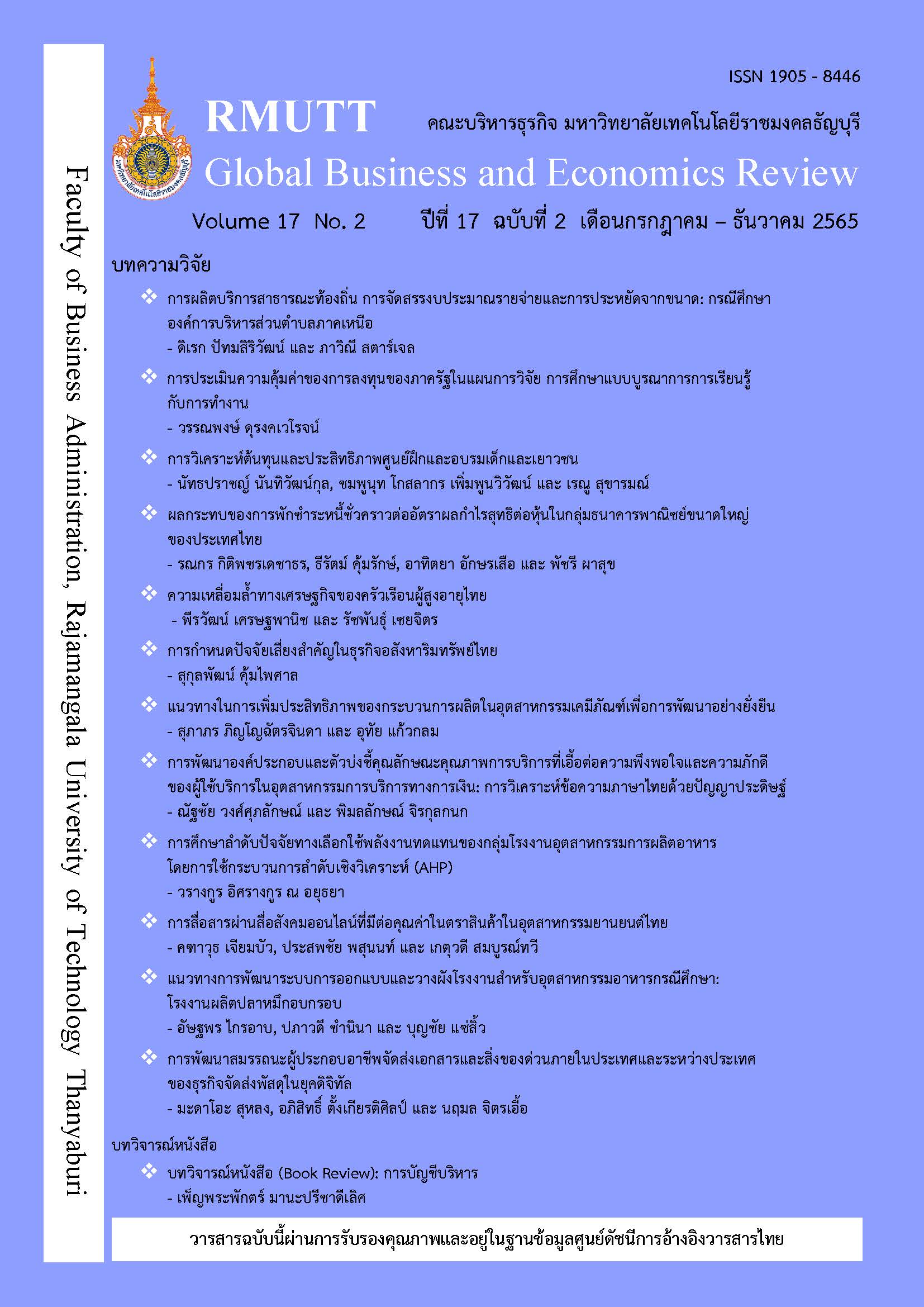GUIDELINES FOR IMPROVING EFFICIENCY OF PRODUCTION PROCESS IN CHEMICAL INDUSTRY FOR SUSTAINABLE DEVELOPMENT
Keywords:
Efficiency, Production Process, Chemical IndustryAbstract
The purpose of this study was to study the management conditions of the chemical industry in order to increase operational efficiency and to create guidelines for increasing the efficiency of production processes in the chemical industry for sustainable development. Whereas, two methods were used in this research, namely, Area Frame Survey and In-depth Interview. The areas surveyed in this research are two chemical industrial estates, namely, Bangpoo Industrial Estate and Map Ta Phut Industrial Estate. The In-depth Interview was an in-depth interview with 17 factory managers working in the industrial estates. The tool used in this research and data collection was a semi-structured interview guideline. For management of chemical industry in Map Ta Phut and Bangpu Industrial Estates, businesses have been operated with attention paid to environmental conservation in communities and society under the principles of ethics and good governance leading to sustainable success of business operation. When considering on operational efficiency of production process, industrial estates released wastewater of companies calculated to be 80 percent of total consumed water. In addition, in wastewater treatment process, chemicals were used causing higher expenses. Consequently, the measures on water reuse were established. According to observation on characteristics and management of factories, it was found that wastewater collection of factories was in the form of pipes for collecting wastewater from each point of production process to central cesspool without any meter for measuring water content in many points of digestion process. The Guidelines for Improving Efficiency of Production Process in Chemical Industry for Sustainable Development could be concluded by using measurement for system controlling. Separating wastewater from wastewater collection system would help to reduce burdens of wastewater treatment system by controlling dirtiness of wastewater not to be higher than controlled value. Consequently, treated wastewater would have good quality without causing any environmental impact. In addition, separation of wastewater was also able to be filled for adjusting condition of wastewater to obtain higher Biochemical Oxygen Demand in the event that Biochemical Oxygen Demand of wastewater was greatly lower than controlled value. Therefore, system would be able to be operated under controlled value. For clay sediment’s water obtained from water production process, clay sediment could be disappeared after leaving. Clear water separated from clay sediment could be reused for producing water from the next treatment that would help to reduce content of groundwater pumping.
References
กนกกาญจน์ น้อยนาช, วรางคณา ศรนิล และ วิสาขา ภู่จินดา. (2558). การพัฒนาเมืองอุตสาหกรรมเชิงนิเวศอย่างยั่งยืน: กรณีศึกษานิคมอุตสาหกรรมบางชัน. วารสารครุศาสตร์อุตสาหกรรม, 14(2), 312-319.
กรมควบคุมมลพิษ. (2558). คู่มือความรู้ทั่วไปเกี่ยวกับระบบบำบัดน้ำเสียเบื้องต้นและการตรวจสอบระบบบำบัดน้ำเสียด้วยตนเอง. กรุงเทพฯ: กรมควบคุมมลพิษ กระทรวงทรัพยากรธรรมชาติและสิ่งแวดล้อม.
กระทรวงอุตสาหกรรม. (2545, พฤษภาคม-มิถุนายน). แนวคิดเทคโนโลยีสะอาด (Clean Technology). วารสารกรมสงเสริมอุตสาหกรรม.
การนิคมอุตสาหกรรมแห่งประเทศไทย. (2563). คู่มือการตรวจประเมินเพื่อให้การรับรองการเป็นเมืองอุตสาหกรรมเชิงนิเวศ. กรุงเทพฯ: การนิคมอุตสาหกรรมแห่งประเทศไทย.
กิติกร จามรดุสิต. (2553). การวิเคราะห์ และพัฒนาดุลยภาพเชิงนิเวศเศรษฐกิจของวิสาหกิจในเขตพื้นที่จังหวัดระยอง. วารสารวิจัยและพัฒนาเชิงพื้นที่, 2, 5-16.
คุณาวุฒิ เทียมทอง. (2546). แนวคิดของเทคโนโลยีสะอาด. สืบค้นจาก http://www.thaienvironment.net
จิตพนธ์ ชุมเกตุ. (2558). การพัฒนาเกณฑ์การประเมินมาตรฐานระบบการจัดการเชิงสร้างสรรค์ของกลุ่มธุรกิจชุมชนในภูมิภาคตะวันตกของประเทศไทย. (วิทยานิพนธ์ปริญญาดุษฎีบัณฑิต, มหาวิทยาลัยศิลปากร).
ไชยรัตน์ เจริญสินโอฬาร. (2543). วาทกรรมการพัฒนา: อำนาจ ความรู้ ความจริง เอกลักษณ์และความเป็นอื่น. กรุงเทพฯ: วิภาษา.
เนตรทราย นิสสัยสุข. (2556). ผลกระทบจากการพัฒนาอุตสาหกรรมอีสเทิร์นซีบอร์ด ระยอง กรณีศึกษาชุมชนตำบลมาบยางพร อำเภอปลวกแดง จังหวัดระยอง. (วิทยานิพนธ์ปริญญามหาบัณฑิต, มหาวิทยาลัยบูรพา).
ถนอม ไชยวงศ์ และ พัชรินทร์ ระวียัน. (2548). การประยุกต์ใช้เทคโนโลยีสะอาดในการผลิตถั่วเหลืองฝักสดแช่เยือกแข็ง. วารสารวิจัยสภาวะแวดล้อม, 27(2), 43-54.
พรทิพย์ ศรีแดง, พนาลี ชีวกิดาการ และ ชลิดา เลี่ยมสงวน. (2551). การประยุกต์ใช้หลักการการประเมินวัฎจักรชีวิตของผลิตภัณฑ์ร่วมกับเทคโนโลยีสะอาดเพื่อป้องกันและลดมลพิษจากแหล่งกำเนิดอุตสาหกรรมชุมชนประเภทปลาหมึกตากแห้ง. สงขลา: มหาวิทยาลัยสงขลานครินทร์.
สวรส วิลัย. (2563). การศึกษาแนวทางการประยุกต์ใช้หลักการเทคโนโลยีสะอาด (Clean Technology) ในโรงงานอุตสาหกรรมอาหารแปรรูป กรณีศึกษา โรงงานแปรรูปอาหารแห่งหนึ่ง. (รายงานการค้นคว้าอิสระปริญญามหาบัณฑิต, สถาบันบัณฑิตพัฒนบริหารศาสตร์).
สำนักงานนโยบายและแผนทรัพยากรธรรมชาติและสิ่งแวดล้อม. (2565). รายงานสถานการณ์คุณภาพสิ่งแวดล้อม พ.ศ. 2564. กรุงเทพฯ: สำนักงานนโยบายและแผนทรัพยากรธรรมชาติและสิ่งแวดล้อม กระทรวงทรัพยากรธรรมชาติและสิ่งแวดล้อม.
อรปรียา เล่งวงค์. (2563). การลดปริมาณการใช้น้ำกรณีศึกษาอุตสาหกรรมผลิตยางรถยนต์แห่งหนึ่งในจังหวัดสงขลา. (สารนิพนธ์ปริญญามหาบัณฑิต, มหาวิทยาลัยสงขลานครินทร์).
Behne, B. A. (2016). Industrial Ecology Analysis of the Potential for an Eastern Nebraska Industrial Symbiosis Network (ENISN): A Comparative Study. (Dissertation, School of Natural Resources, University of Nebraska-Lincoln, United States).
Denzin. (1978). Sociological methods: a sourcebook. New York: McGraw-Hill.
Lincoln, Y. S., & Guba, E. G. (1985). Naturalistic inquiry. Newbury Park, CA: Sage Publications.
Macmillan, T. T. (1971). The Delphi Technique. Paper Presented at the annual meeting of the California Junior Colleges Associations Committee on Research and Development, Monterey, California. (May 1971), 3-5.
Montalvo, C., & Kemp, R. (2008). Cleaner technology diffusion: case studies, modeling and policy. Journal of Cleaner Production, 16(1), 1-6.
Salah, M. E. (2007). Chapter 2-Cleaner Production. Sustainable Industrial Design and Waste Management, 21-84.
Thrane, M., Nielsen, H. E., & Christensen, P. (2009). Cleaner production in Danish fish processing experiences, status and possible future strategies. Journal of Cleaner Production, 17(3), 380-390.
Unnikrishnan, S., & Hegde, D. S. (2006). An analysis of cleaner production and its impact on health hazards in the workplace. Environment International, 32(1), 87-94.
Downloads
Published
How to Cite
Issue
Section
License
Copyright (c) 2022 สุภาภร ภิญโญฉัตรจินดา, อุทัย แก้วกลม

This work is licensed under a Creative Commons Attribution-NonCommercial-NoDerivatives 4.0 International License.
The articles published in this journal are the intellectual property of their respective authors.
The views and opinions expressed in each article are solely those of the individual authors and do not reflect the positions of Rajamangala University of Technology Thanyaburi or any of its faculty members. All components and content of each article are the sole responsibility of the respective authors. In the event of any errors, the authors shall bear full responsibility for their own work.








